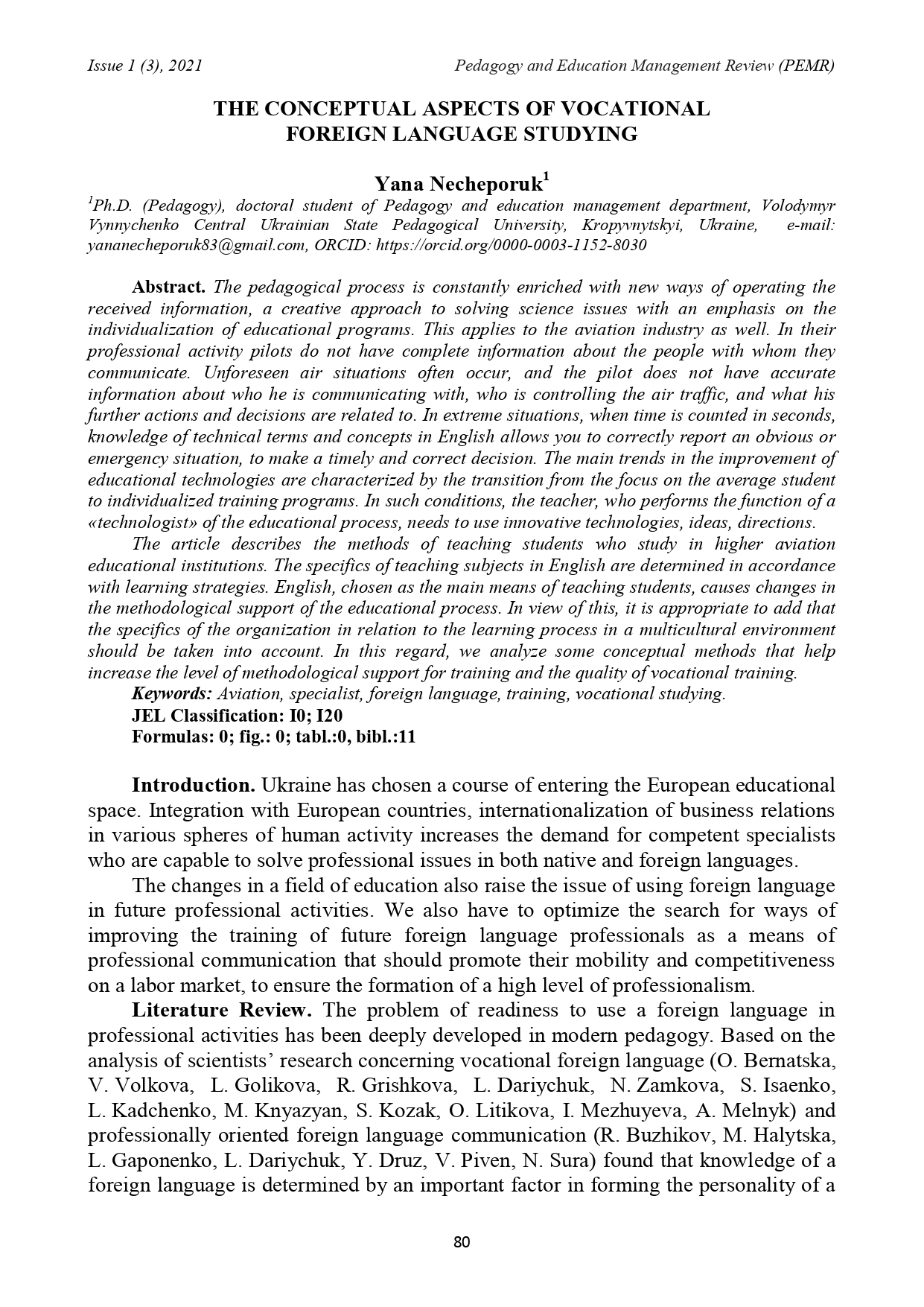THE CONCEPTUAL ASPECTS OF VOCATIONAL FOREIGN LANGUAGE STUDYING
DOI:
https://doi.org/10.36690/2733-2039-2021-1-80Keywords:
Aviation, specialist, foreign language, training, vocational studyingAbstract
The pedagogical process is constantly enriched with new ways of operating the received information, a creative approach to solving science issues with an emphasis on the individualization of educational programs. This applies to the aviation industry as well. In their professional activity pilots do not have complete information about the people with whom they communicate. Unforeseen air situations often occur, and the pilot does not have accurate information about who he is communicating with, who is controlling the air traffic, and what his further actions and decisions are related to. In extreme situations, when time is counted in seconds, knowledge of technical terms and concepts in English allows you to correctly report an obvious or emergency situation, to make a timely and correct decision. The main trends in the improvement of educational technologies are characterized by the transition from the focus on the average student to individualized training programs. In such conditions, the teacher, who performs the function of a «technologist» of the educational process, needs to use innovative technologies, ideas, directions.
The article describes the methods of teaching students who study in higher aviation educational institutions. The specifics of teaching subjects in English are determined in accordance with learning strategies. English, chosen as the main means of teaching students, causes changes in the methodological support of the educational process. In view of this, it is appropriate to add that the specifics of the organization in relation to the learning process in a multicultural environment should be taken into account. In this regard, we analyze some conceptual methods that help increase the level of methodological support for training and the quality of vocational training.
Downloads
References
Barabanova, G.V. (2005), Metodyka navchannia profesiino-orientovanogo chytannia v nemovnomu VNZ [Methods of Teaching of Professionally-Oriented Reading in the Nonlinguistic Higher Educational Institutions], INKOS, Кyiv, Ukraine.
Biretska, L.S. (2014), Vpravy dlia formuvannia anhlomovnoi leksychnoi kompetentnosti maibutnikh likariv u profesiino oriientovanomu chytanni [English lexical competence formation tasks for future doctors in professional reading]. Inozemni movy, 3 (79), Kyiv, Ukraine.
Kharlamova, L.S., Chala, N.D., Kovaleva, I.V. (2020), Modern technologies of teaching foreign languages in technical higher institutions. Scientific Bulletin of the Flight Academy. Series: Pedagogical sciences, 7. Retrieved 12.07.2020 from http://ksgn.hol.es/wpcontent/uploads/2017/04/33-1.pdf. (in Ukr.).
Melnikov, M.V. (2016), Formirovanie rechevoi kompetentnosti budushhikh inzhenerov na osnove polimodal'nogo predctavleniya uchebnogo materiala v protsesse profeccional'noi pіdgotovki [The formation of speech competence of future engineers on the basis of a multimodal representation of educational material in the process of professional training], Extended abstract of candidate‘s thesis, Ulyanovsk, Russia.
Moskalenko, O.I. (2020), Humanitarna pidhotovka maybutnikh fakhivtsiv aviatsiynoyi haluzi iz vykorystannyam innivatsiynykh tekhnolohiy [Humanitarian preparation of future aviation specialists by means of innovative technologies], Cherkassy, Ukraine.
Semenchіk, Yu.O. (2006), Psykholoho-pedahohichni peredumovy formuvannia leksychnoi kompetentsii u studentiv ekonomichnykh spetsialnostei [Psychological and pedagogical prerequisites of lexical competence formation of students of economic specialties], Psykholohiia i suspilstvo, 4.
Tarnopolskii, O.B. (1999), Project English dlya povysheniya effektivnosti obucheniya angliiskomu yazyku vo vzrosloi auditorii [Project English for increasing the efficiency of teaching English at an adult audience], In Innovatsiini pidkhody do vykladannia inozemnykh mov (pp.193-196), Dnipropetrovsk, Ukraine.
Vadanska, S.V. (2017), Osoblyvosti formuvannya inshomovnoi kompetentnosti studentiv v galuzi avia ta raketobuduvannya [Students’ lexical competence formation in the field of air and rocket building.], Kyiv, Ukraine.
Edmondson, W., House, J. (1993), Einfuerung in die Sprachlehrfor-schung. Tuebingen; Basel: Francke, 341 S.
Handbuch. Fremdsprachenunterricht / hrsg. von K.-R. Bausch u. a. Tuebingen, France, 1989, 495 S.
Doc 9835-AN/453 Manual on the Implementation of the ICAO Language Proficiency Requirements, Preliminary edition, 2004, 162 c.






